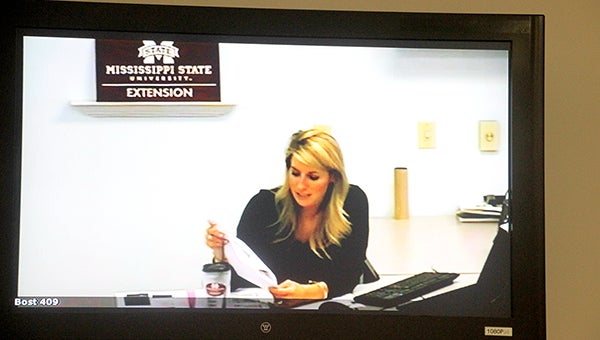Program helps sort out the facts
Published 11:21 am Saturday, January 14, 2017

- VIDEO CONFERENCE:: MSU extension instructor Lauren Lindley presents an interactive video conference Thursday at the Warren County MSU Extension Center office, 1100-C Grove St. The hour-long Quick Bite program was entitled “Distinguishing the Internet’s True & False.”
The tale of “Chicken Little” is a fine example of how false information can lead to a less than positive outcome. Before fact checking, all of the hen’s friends decided to believe the sky was falling and in their haste to locate a safe haven, all wound up being lured into a foxhole and eaten.
Thursday, the Warren County office of the MSU Extension Center presented a Quick Bite program, which focuses on ways to help distinguish truthful information found on the Internet from false material.
“The World Wide Web is a big place, and there is nothing you can do about the content that is going to show up,” MSU extension instructor Lauren Lindley said.
“We live in a society that forces us to question almost everything we see on the internet and the world we live in allows news to spread like wildfire, thanks to mass media, the web, and all forms of social media,” she said.
There are some ways to combat all this information from reaching your computer through your browser or search engines, she said, but unfortunately it does not protect 100 percent from ambiguous information that is shared, fake news — which is becoming more prominent on social media platforms — false websites and fabricated information on real websites from viable news sources.
For those seeking to weed through false information, Lindley suggested one way to combat misinformation is to pay close attention to headlines.
The purpose of a headline is to grab the reader’s attention, Lindley said, so if a headline seems fishy — for example, Big Foot was spotted — this could be the first red flag that the information is bogus.
“Headlines are meant to be informative, but also short and sweet, so you need to look for vagueness, absurdity and too many details,” Lindley said.
Headlines can also appear believable, but if one were to read further it would become obvious the story is fake.
“There are some Internet sources that are paid to generate false narratives, like the Onion,” Lindley said.
The Onion is a digital media company that writes satirical pieces on international, national, and local news.
“Some people believe that The Onion is a viable news source and compare it to Fox News, CNN and ESPN,” she said, but added if most were to read past the headline it would become evident the story is facetious.
Lindley also advised reading a story before sharing it, since information can be more easily accessed.
“With the combination of internet access and smart phones, consumers can collect information virtually anywhere and any time all you need is wi-fi access. This seems like a societal advantage until we realize that a large percentage of this collected information is bogus whether it is completely made up or elaborated,” she said.
Before trusting that the information read on the Internet as truth, Lindley said to ask oneself some questions.
“Is it believable? If it does seem real, does it seem a little bit fabricated? And is it coming from a viable news source?”
And if still in doubt, a good way to decide if something is true is to cross references sources, Lindley said.






